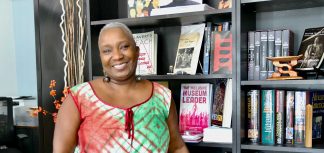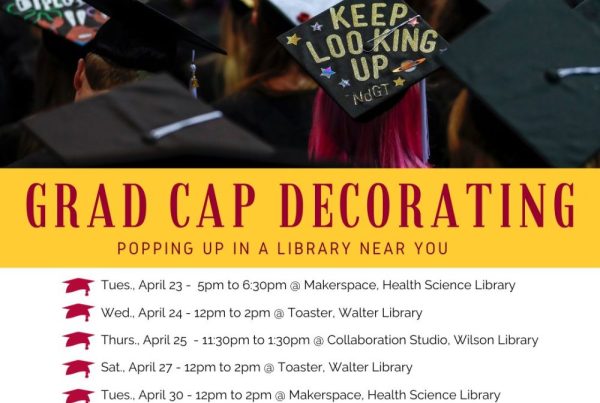By Allison Campbell-Jensen
Rekhet Si-Asar is a small-in-stature person who makes a big impression.
“It’s like magic to watch her,” says Lissa Jones-Lofgren, chair-elect of the Friends of the University of Minnesota Libraries board. Over the past 20 years, she has known and admired Si-Asar for her high level of energy and her outstanding ways and results with people and with books.
Si-Asar, who runs the St. Paul publishing arts organization In Black Ink, works part-time as a psychologist in the Minnneapolis Public Schools, and is also a devoted parent.
“Knowing that she is a human being, but she can with every breath, with every act, advise the world, share with whoever is in her audience the wonder and beauty of Black culture — and she does so through literacy and through publishing. …” She sighs, pauses, and continues.
“Reading is liberation; it is fundamental,” Jones-Lofgren says. “For black people who were forbidden to read [during their enslavement], it is especially powerful.” She says Si-Asar was an obvious choice when Jones-Lofgren and Edie French, formerly of the Friends board, were thinking of literary people to recruit to serve on the board.
The library as a haven
“Even now, content in the library has not been geared to communities of color. The selection and available resources should mirror the community.”
—Rekhet Si-Asar
For her part, Si-Asar felt happy to be asked. Born in Guyana, she was raised in Brooklyn, New York, where the local library was a quiet place for her to study away from her large family — her mother had six children and a grandmother in the home. So, as a youngster, the library was an ideal place to meet her friends.
“I’ve heard a lot of stories of people finding value in the library,” Si-Asar says. “Sometimes as a place to hang out — a safe place in communities of color . … [Libraries] are places of learning, engagement, and explorations.”
A balletomane whose family couldn’t afford lessons, Si-Asar read every book in her local library about the art of ballet and even taught herself the dance positions. She was able to develop her talent as a visual artist by attending specialized arts schools. As a result, she had the opportunity as a teen to take a summer internship in costume design at the Met in New York City.
“I got the opportunity to meet Baryshnikov; he was like 5’ 4” — with the clogs.” She was in awe; her family members were not as impressed. Well, they had not read all those books.
Make libraries comfortable for everybody
“I just wanted peace,” Si-Asar now says of her early days in the local library and in her family. Yet now she realizes that more intentional approaches could help young people of every culture.
“Even now, content in the library has not been geared to communities of color,” Si-Asar says. “The selection and available resources should mirror the community. Everybody needs to feel comfortable in the library.”
Si-Asar joined the board because she believed the Friends of the U of M Libraries would be a good tie to her literary work with In Black Ink — Plus, “there’s a lot of things I’m able to learn.” During the pandemic, however, she says, “You were your own island.” Most of her Friends events and meetings have been online: “I like the options [with Zoom, etc.], but we’re social beings.”
Sandy Moore is a grant writer who has worked with Si-Asar on grant proposals and, in the process, became a friend and a fan. “She is the calmest, most gracious, most welcoming person,” Moore says. “She lives her values in whatever she does.”
Si-Asar strives to offer opportunities to young people to learn more — about their communities, their world, and themselves. In one series of books for young people that In Black Ink publishes, Moore says, “readers learn the history of Rondo — what it meant to be part of that neighborhood in its heyday.”
The historic Rondo neighborhood was gutted by the construction of I-94 through St. Paul. This series of books show how an earlier Rondo and its Black culture nurtured values of family, caring, and hard work.
“Mr. Rondo’s Spirit,” for instance, illuminates the life of a Pullman train porter; the author is Ericka Dennis and Mychal Batson is the illustrator. Black porters held high-prestige jobs in Rondo, often stayed in boardinghouses (“the first Airbnbs,” Si-Asar says), and, by giving back to the community that nurtured them, becoming role models.
Fomenting tolerance and openness
“I think that I have never known a person who has committed themselves so fully to something — in her case, the support of black culture and expression — that every single thing she does seems to be ordered in that direction.”
—Lissa Jones-Lofgren
As is Si-Asar, who joined in a circle of Black excellence with Lissa Jones-Lofgren and others that was organized by Mahmoud El-Kati, Black activitist and professor at Macalester College. From that start, 20 years ago, Si-Asar has been seeking ways to help young people. Her work includes an Ordway education curriculum called “Visionaries Who Matter,” about three Black artists: Lou Bellamy, Gary Hines, and Seitu Jones.
With this connection and this piece, she appreciates being able to offer families with children “really basic activities that help them learn [about these artists] and also track their own path.” She adds: “Showing young people what’s possible is half the battle for them.”
She also hosts a bi-annual event series called Sankofa that brings community together at an annual conference/celebration in the fall, while launching an anthology with writings from notable community members. This year’s theme: Media and the Black community.
She was taught by her father, an artist, to cultivate her own artistic talents; her mother called her “an old soul.” In choosing the path of psychologist for the schools, she has found a great deal of satisfaction.
“I just love working with young people,” Si-Asar says, “and have them be surprised at how they can manifest a better self.” She encourages her own children to follow their own paths.
One of them, who worked in Francophone Benin for the Peace Corps for a couple of years, currently attends Johns Hopkins University, studying international relations at the graduate level.
She herself, after transferring as a schoolchild from a former colony where people spoke British English, was for a time in the United States a “selective mute,” speaking only to family and close friends.
After a time, her shyness slipped away and she found her voice.
“You’ve got to build up your tolerance to try new things,” she says of learning American English, eating new-to-you vegetables, and experimenting with different, more positive behaviors, which she encourages among the young people she supports in Minneapolis schools.
Says Lissa Jones-Lofgren: “I think that I have never known a person who has committed themselves so fully to something — in her case, the support of black culture and expression — that every single thing she does seems to be ordered in that direction.”





